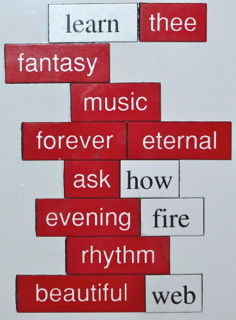Sometimes, a fairly simple question inspires an amazing answer. DVK noticed someone say that there was important background information contained in the poems found in [tag]lord-of-the-rings[/tag], but couldn’t recall any himself.
Personally, I admit that I often skip or lightly skim-read poetry in novels. Like many fantasy readers, I’ve read Lord of the Rings many times, and I’ve probably properly read the poetry only once or twice (I do remember using one of them in a school exercise, so it must be at least once!). Partly this is because I don’t enjoy the poetry form as much, and partly I guess I’m assuming that nothing important is happening there and I’d rather move forward to the action.
This question has only one main answer (there’s another, but the question was later revised – I do love the description of The Silmarillion as a “wonderful and tedious read”), but it’s over 2,000 words long! In it, Gilles explains that although you can get by without reading the poems – as I and I expect many others do – you’re reducing your enjoyment of the book by doing so. I highly recommend that you go and read the full answer, which analyses each poem in turn. Here I’ll simply touch on a few of the main points from each of the six books in the story.
In the first book of The Fellowship of the Ring, the poems introduce us to Hobbit and Elvish lore, behaviour, and attitude – there’s also the crucial rings rhyme (“Three Rings for the Elven-kings…”), which is probably the one poem that everyone has read.
The second book of Fellowship continues this, telling us more about the Elves, Bombadil, Dwarves and other peoples of Middle Earth, but also foreshadows events that will take place later in the story, and provides hints at the greater history of Arda that is more fully detailed in The Silmarillion and later books. The poetry in this book tells us a lot about who Aragorn is, and the background of his and Arwen’s relationship; we also get a hint as to Frodo’s eventual fate.
Just as the travellers move on in The Two Towers, so does the poetry. In book three, we learn more about the human lands and the Ents. Galadriel’s poems to the company are particularly prophetic in telling Aragorn what he must do, and Legolas what his fate shall be. The fourth book is the low point in the characters’ morale, and this is reflected by a lack of uplifting poetry – we mostly get rhymes from Gollum, which help us understand his character.
As we move to book five and The Return of the King, we get many poems and songs about the battles that are fought during this part of the tale. We get another poem leading Aragorn to the Paths of the Dead, and more background about the current and past state of Gonder and the Rohirrim.
In the final book, the poetry is about the historic events that the reader has either just read through or is about to, and marking the parting of ways that ends the story.
What we learn from Gilles, overall, is that the poems serve to illustrate the various cultures and the mental journey of the characters. It sounds like it’s time to pull the books of the shelf, and read them properly this time!
Like this:
Like Loading...

